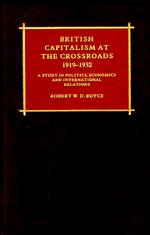 British Capitalism at the Crossroads, 1919–1932
British Capitalism at the Crossroads, 1919–1932 Book contents
- Frontmatter
- Contents
- Preface
- List of abbreviations
- Introduction
- 1 THE POLITICS OF ECONOMIC INTERNATIONALISM
- 2 CRUCIFIED ON A CROSS OF GOLD
- 3 ‘NORMALCY’
- 4 CONFLICT OVER COMMERCE
- 5 THE SCRAMBLE FOR GOLD
- 6 THE SECOND LABOUR GOVERNMENT AT THE HAGUE
- 7 FREE TRADE: THE LAST OFFENSIVE
- 8 THE CHALLENGE OF REGIONALISM
- 9 THE GOLD STANDARD UNDERMINED
- 10 THE AUSTRO-GERMAN CUSTOMS UNION CRISIS
- 11 THE COLLAPSE OF ECONOMIC INTERNATIONALISM
- Conclusion
- Notes
- Bibliography
- Index
11 - THE COLLAPSE OF ECONOMIC INTERNATIONALISM
Published online by Cambridge University Press: 05 November 2011
- Frontmatter
- Contents
- Preface
- List of abbreviations
- Introduction
- 1 THE POLITICS OF ECONOMIC INTERNATIONALISM
- 2 CRUCIFIED ON A CROSS OF GOLD
- 3 ‘NORMALCY’
- 4 CONFLICT OVER COMMERCE
- 5 THE SCRAMBLE FOR GOLD
- 6 THE SECOND LABOUR GOVERNMENT AT THE HAGUE
- 7 FREE TRADE: THE LAST OFFENSIVE
- 8 THE CHALLENGE OF REGIONALISM
- 9 THE GOLD STANDARD UNDERMINED
- 10 THE AUSTRO-GERMAN CUSTOMS UNION CRISIS
- 11 THE COLLAPSE OF ECONOMIC INTERNATIONALISM
- Conclusion
- Notes
- Bibliography
- Index
Summary
In his effort to diffuse the Austro-German customs union crisis in April 1931, Arthur Henderson had encouraged fellow statesmen in Europe to rely on an international solution to the growing economic troubles afflicting the continent. He assured them that the working party of the CEUE would provide a lead when it met in Geneva late in June. Understanding little about economics and even less about the inspiration for the CEUE, it seems unlikely that he had any clear idea of what it might accomplish, unless that the British representative might convert the others to free – or at least freer – trade by preaching against the sin of protectionism. In that case Walter Lay ton was an appropriate choice for the assignment.
Layton, editor of The Economist and stalwart internationalist, consented reluctantly to go to Geneva on 24 June, believing that the continental countries were economically nationalist beyond redemption. For all his much-vaunted intelligence sources, he was unprepared for the intense interest shown by continental representatives in entering into regional or bilateral customs unions to counter the drift towards autarky. The Northern countries as well as Austria, Germany, and more cautiously France, all indicated their willingness to grant Britain and other free trade countries most-favoured-nation treatment within their respective projects. ‘The point which interested everybody was the relationship between any such project and Great Britain.’ Layton was equally impressed by the Francqui plan for promoting international lending, which he seemed to know little about beforehand. But this too remained merely a good idea when the committee adjourned until 18 August.
- Type
- Chapter
- Information
- British Capitalism at the Crossroads, 1919–1932A Study in Politics, Economics, and International Relations, pp. 330 - 369Publisher: Cambridge University PressPrint publication year: 1988


